Find us on:
How To Stop And Vanquish Procrastination? 9 Simple Tips
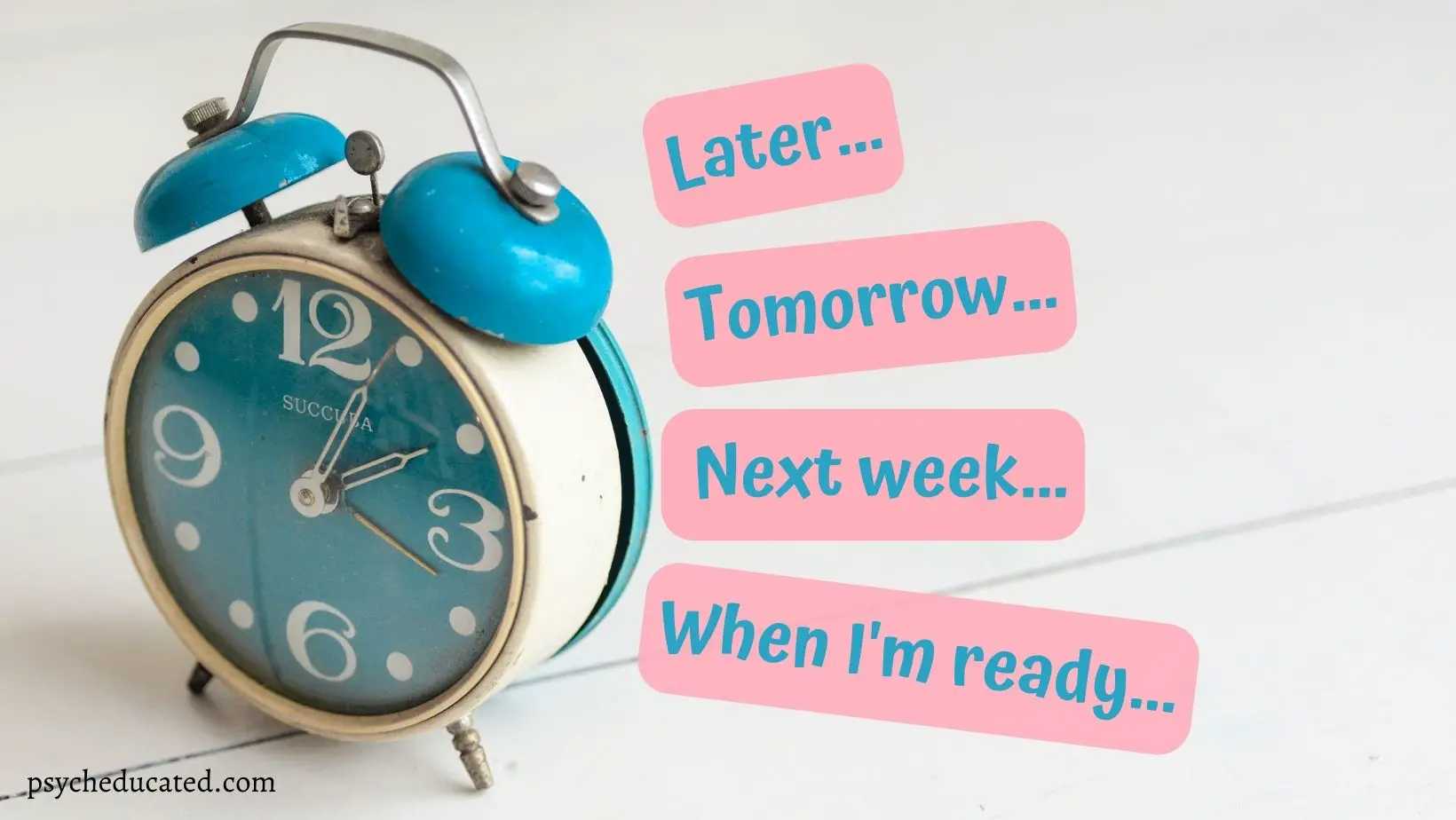
Is there something else that you should be doing right now?
I bet there is! And you want to know why you are procrastinating and how to stop this behavior and go do what you need to be doing.
Well, don’t go just yet! Spend another few minutes of your precious procrastination time on this article, and, hopefully, it will help you stop the habit of procrastinating and start getting things done.
Disclosure: This post contains affiliate links for your convenience. Please read our Disclaimer for more information.
Everybody procrastinates
The first thing that you need to know to take a little pressure off of your shoulders is that you’re absolutely not alone!
People are constantly procrastinating on doing something.
Everybody has struggled at some point with procrastination. No one is immune to it.
When I was a student, I always waited until the last minute to do my assignments and prepare for my exams. Even today, I still procrastinate. I sometimes prepare my lesson, like, one or two hours before I teach my class.
To be honest, I procrastinated a lot before writing this article about procrastination. Ha ha!
I’m not going to sit here and preach about how to stop procrastination, pretending that I have everything figured out and that I’m a perfect human being. Because I’m not, and nobody is!
I’m going to share with you here what I’ve learned by analyzing the situations in which I used to procrastinate and those in which I still do today; also what I’ve learned by researching the topic. What the experts on the matter have concluded and what scientific research has verified.
What’s procrastination?
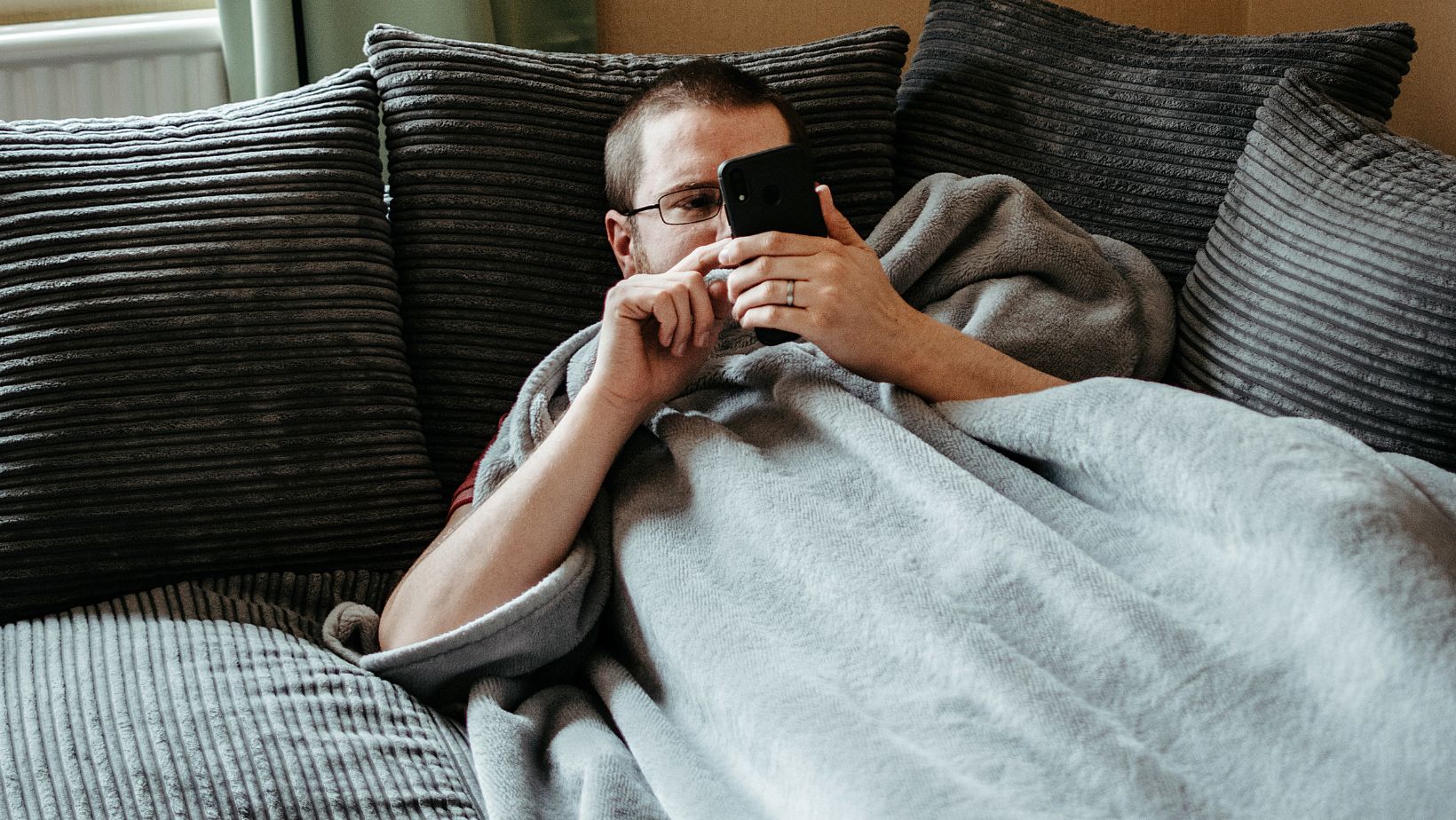
We may think that the world we live in today, with all its distractions, is what created procrastination, but the truth is that procrastination has always been around.
Socrates called it “Akrasia,” which means to act against our better judgment by doing something that isn’t best for us even though we know we should be doing something else.
Procrastination is the act of delaying the completion or even the beginning of a task.
We delay things that don’t give us that instant gratification. We prefer instead to enjoy things that amuse us, watch our favorite series, or chat with friends.
Procrastination can also be defined as the resistance that people experience to doing work. It can sometimes be very strong and can make us come up with creative ways to escape labor.
Why do we procrastinate?
Pay attention to the following reasons: I’m sure you’ll find yourself in many of those. Knowing why you procrastinate is the first step that can help you stop procrastination.
Procrastination is a form of stress relief
Let’s say I have a very important presentation that I have to prepare for work, and I’m feeling very overwhelmed and stressed by the task, and every time I think about it, anxiety kicks in because I know how unpleasant it’s going to be to work on it. So what I do instead is keep watching funny videos on YouTube to feel relieved and delay the stress a little longer.
We know that we are not going to enjoy the task, and working on it may feel stressful, so we delay that feeling by delaying the task.
Mel Robbins, author, and coach says that:
Procrastination is not the issue; it’s stress. You’re procrastinating to give yourself a little break at work.
Mel Robbins
And that’s exactly how procrastination works. When we stress, we take that break. We procrastinate.
We think too much
People who procrastinate are mostly overthinkers, and excessive thinking is what releases stress hormones and makes us look for our safe spot.
We put off the work until it’s inevitable. Then we panic and think about how we should have started this earlier. But we don’t learn and we do it all over again. We get stuck in our heads overthinking every little decision.
And before we know it, this will become a habit that will drain our energy and prevent us from doing great things in life.
We are perfectionists
Perfectionism can play a huge role in why people procrastinate. Because the thought of delivering a job that’s not perfect, even if it’s a tiny possibility, can make the procrastinator refrain from doing anything at all.
We procrastinate to blame it on a lack of time

Let’s say I have a project for school or a report that I need to write for work.
If I start doing it right away, with all the necessary time in hand and all the resources available, and it doesn’t turn out okay, the blame is all on me because I had all that it takes to do an excellent job, but I didn’t.
Whereas, if I do it on a really tight schedule, pushing everything I have through the last minutes and pulling it through, I’ll have this feeling of accomplishment because I raced through time and did the impossible to finish my task on time.
Also, if the result isn’t that satisfying, I can just blame it on the lack of time.
I don’t want to spend much time on it
When we don’t want to spend too much time on something, we tend to procrastinate on doing it.
Sometimes I consciously procrastinate on doing some simple tasks because I know if I start doing them early they will consume a lot of time that is not needed at all.
Well, it’s not that bad to want to save time, but this situation can turn out to be problematic if something comes up at the last minute and I can’t do the task at all.
My present self always chooses instant gratification, but I’ll put my future self in a very stressful situation. That’s someone we need to think about a little more.
Procrastination is a self-sabotaging behavior
In a study conducted by Ferrari and Dianne Tice, where they told students that they would be having a math puzzle at the end of the session, they discovered that when students were informed that the test was going to be a significant evaluation of their abilities, they were more likely to put off studying for it. Whereas, when they were told that this test was meaningless and was merely being taken for fun, they carefully prepared for it.
Tice and Ferrari concluded that procrastination is a self-defeating practice, with procrastinators attempting to sabotage their own best work.
We can look at procrastination as a real form of self-sabotaging behavior that the procrastinator uses to protect their self-competence by creating obstacles that reduce the probability of good performance. so that if they fail, the responsibility can be shifted to procrastination and not their competence. But if they succeed, it’s going to be despite the poor circumstances, which is going to boost their self-competence.
Procrastination isn’t the same as being lazy
You know, procrastination isn’t about the work itself. I can procrastinate on sending an email and instead spend two hours reorganizing the closets or cleaning the windows.
So procrastination is not about not wanting to work at all, it’s about that unpleasant task that I kept overthinking the way that I was going to deliver it to the point that I couldn’t do it at all and I just put it off to avoid the stress.
Plus, by working on something else, I avoid feeling unproductive.
Procrastination and laziness are not the same things at all.
Here is an article I wrote on how to stop being lazy and unmotivated.
How to stop procrastination and get things done
Here are some easy tips that you can try to stop procrastination and get things done:
1. Forgive yourself
The first thing you need to do is forgive yourself for all the past procrastination.
Because if you don’t, you’ll get caught up in an endless loop of blame, shame, regret, and procrastination over and over again. And the stress is only going to get bigger and bigger.
Also, make sure not to label yourself as a “procrastinator” because words are very powerful. You are what you say you are. So be careful what you tell yourself and, most importantly, be kind to yourself.
2. You just need to start
The main struggle that procrastinators face is starting.
I think we’ve all experienced stress when we delay a task, and the longer we delay it, the more stressed we get and the harder it feels to start.
So if you can just get yourself to start working, the problem will be solved.
You can use the 5-minute rule, which works like this: commit to yourself that you’re going to work just for 5 minutes, and chances are very high that you’re going to keep working on your task.
3. Stop thinking and limit your decisions
As I said before, procrastinators are big thinkers, and they get trapped in an endless thinking loop.
So, if you want to stop procrastinating and get things done, you must get out of your own head and do the tasks as soon as they arise, rather than thinking about them and letting them pile up, making it more difficult to do anything.
Also, because of this overthinking habit that procrastinators have, you need to limit the number of decisions that you have to make.
For example, if you start your day undecided and not knowing how exactly you’re going to tackle your tasks, Say Hi to procrastination!
Making decisions demands energy, and having to make a lot of those during the day will leave you tired and drained.
What you can do instead is plan ahead. You can do it the night before. Decide what you’re going to do tomorrow and how you’re going to do it, and the next day just work as if you were on auto-pilot without having to think much about anything. That can help big time with overthinking and decision-making.
4. Work in a distraction-free zone

Digital distractions are the biggest problem nowadays.
We live in a world today where we are surrounded by endless sources of distractions that can easily hijack our attention and make us fall into our procrastination habits over and over again.
So what you need to do is turn off all of your devices or use apps like Freedom to help you block distractions.
When you eliminate distractions, look at your workspace. Does it make you feel like working? If it doesn’t, think about changing it. Make some modifications to it, clean it up, or go somewhere else.
5. Give yourself small rewards along the way.
If you have a big project and you want to stop procrastinating on it, you need to break it down into smaller tasks and multiple deadlines.
Then, promise yourself something that you really like every time you reach a small milestone. But, make sure it’s in the very near future so that you can get that gratification early enough and you won’t look for gratification elsewhere.
6. Limit your time
Parkinson’s law states that “work expands so as to fill the time available for its completion.” In other words, if you have a task that can be accomplished in 15 minutes but you have free time and you give yourself 2 hours to do it, you’ll end up spending the entire 2 hours doing this task.
That’s why you have to limit your time because it’s much harder when you don’t have a deadline.
You need to give each task only as much time as it needs, and if a task requires too much time, you can break your time into small chunks.
You can use the Pomodoro technique by setting a timer to work for 25 minutes and then taking a break of 5 minutes. Then you repeat the whole thing. This will create a sense of urgency and help with tasks that demand a lot of work.
7. Use the 2-minute rule
If you have a pending task that’s only going to take 2 minutes to complete, do it now! right away! Don’t wait another second!
You’ll be surprised at how many of those are sitting on the back of your head, adding up to your stress levels.
8. Have someone hold you accountable
Telling someone about your plans and the time you have set to finish them can make you push yourself a little more when you know that someone is watching.
You can also make yourself accountable by writing down your plans in detail, setting due dates, and checking things off as you go.
9. Take a step back and assess
To make yourself stop procrastinating, you need to know yourself. What works for others may not work for you.
If you take a step back and try to evaluate the situations in which you procrastinate, you’ll understand a lot about yourself and why you’re delaying these particular tasks.
Notice how much you enjoy your fun activities when you are not delaying something versus when you are avoiding a task, and try to reproduce that feeling by finishing work first and then enjoying your other activities.
Here is another article that you may find useful: 13 easy habits to increase productivity and get things done.
Conclusion
It’s hard to change a habit that you have been used to for so long, but it’s still very possible if you just want to change it and commit to doing it.
If you want to stop procrastinating, start by understanding why you procrastinate, what’s stressing you out, and what you’re afraid of. Knowing will tell you so much about yourself. Maybe you’ll find out that it’s a very silly reason.
Then, to stop procrastination and start getting things done, try the tips I’ve mentioned above. They may not all work for you, but I’m sure some will. Give them a try and don’t give up. A habit won’t change by night; it needs time.
Have you tried some of these before? Tell me in the comments!
Don’t forget to share this article on social media to help someone else.
Pin me!
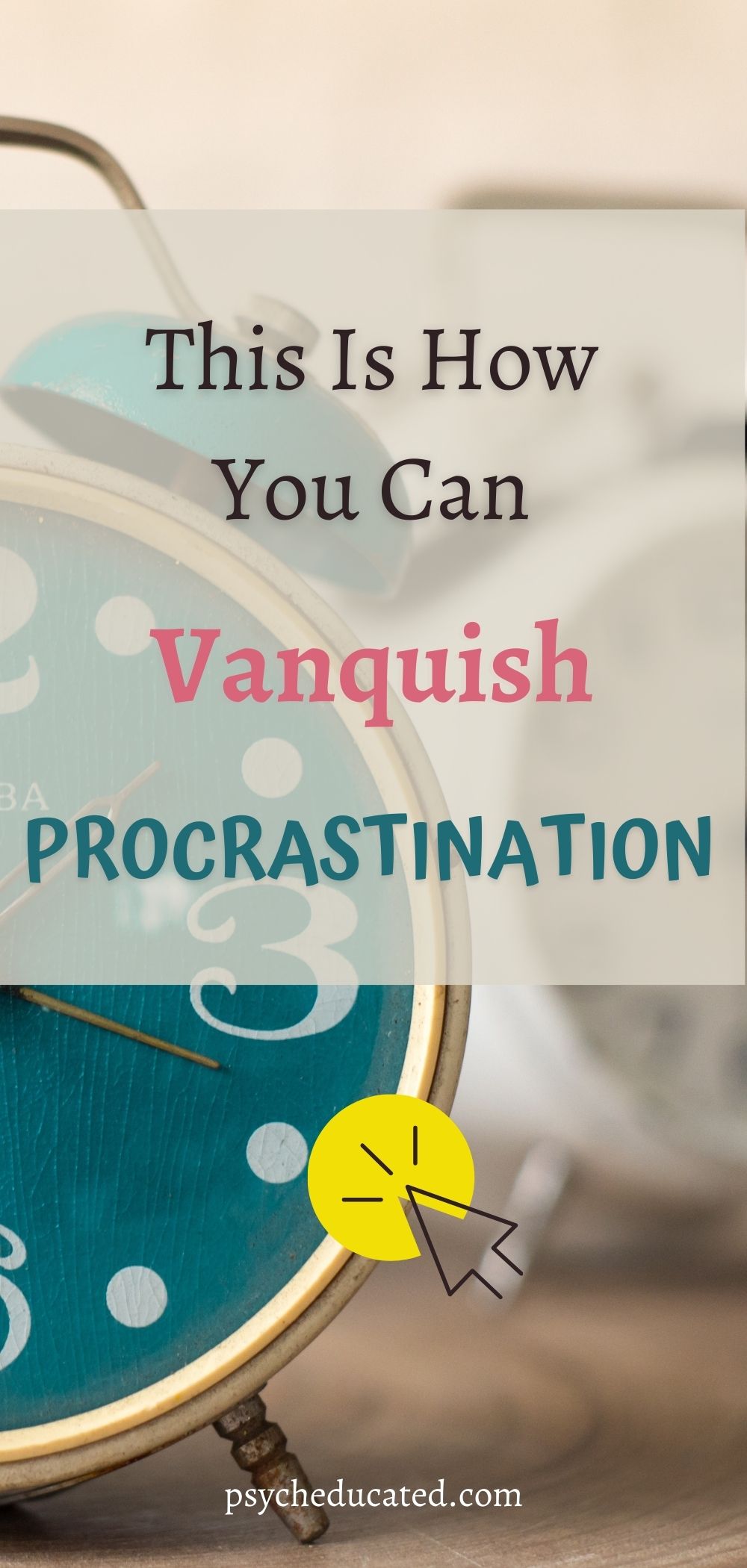

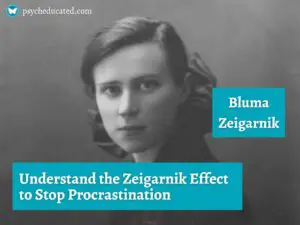
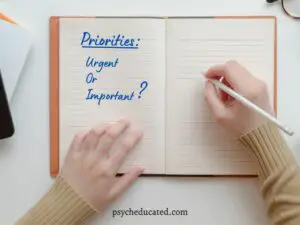


5 minute rule is genius and it definitely works
Yeah! It really works. I use it all the time.
Thanks for reading!
I’m a huge procrastinator especially with tasks I dont enjoy doing. I love the reasons you included in the post. Some made me go “yep that’s me.” Thanks for sharing!
Yeah, us procrastinators understand the struggle. Thanks for reading!
It’s good to know when you are limiting yourself. Its good to know when your overthinking. I have find myself sometimes overthinking and telling myself to calm down and know everything is going to be okay.
Exactly! When we are more conscious of our behavior we’ll be able to work on ourselves and grow into better human beings…